GPT-3: How Will This Impact SEO and Content Marketing?

Table of Contents
- The Buzz Around GPT-3
- Human vs GPT-3 Writing
- GPT 3: Its Impact on SEO and Content Marketing
- Key Takeaways
- Final Words
- FAQs
AI (Artificial Intelligence) is fascinating and futuristic, yet tech stalwarts like Elon Musk and Bill Gates and scientists like Stephen Hawkings have spoken about their increasing wariness of AI. Not denying that by facilitating automation, AI generated content is making daily life easier in many ways, but on the professional front, job automation fuels people’s fears of being replaced by robots.
Advances in AI have empowered machines to become more intelligent over time, to the point that they have learned to use their training and knowledge to make logic-based decisions with little or no human interventions. Thus, it poses a threat not just to manual jobs that are kind of repetitive, but even those jobs that require learning and decision-making.
One such job is that of content marketers or writers, who put in logical thinking, creativity, and research to create content (text) relatable for a reader. But it seems, with the advent of Generative Pre-Trained Transformer Version 3 (GPT-3) and other automated content writing technologies, AI can produce human-like text but at a much faster speed. So, it is pivotal for content marketers to understand how GPT-3 content generator will impact the future of content marketing and Search Engine Optimization (SEO).
The Buzz Around GPT-3
If you are professionally into content marketing, a digital marketing agency, a writer, or an SEO expert, you must have heard the GPT-3 copywriting buzz by now. Before discussing its impact on SEO and content marketing, let’s understand GPT-3 content generator a bit more technically.
Introduced by OpenAI, a San Francisco-based AI research laboratory, GPT-3 is a deep neural network that can learn by processing examples. It is functional as an autoregressive language model for natural language processing (NLP) systems. In simple words, GPT-3 is an AI-powered pre-trained language model that can automatically generate text. It is not the first of its kind, as we already have Microsoft’s language model, Turing NLG, NVIDIA’s Megatron, and GPT-2, the direct predecessor of GPT-3.
But why has GPT-3 SEO generated so much hype? This is because the quality of automated content writing by GPT-3 copywriting is so high that it gets hard to distinguish it from the text written by real writers.
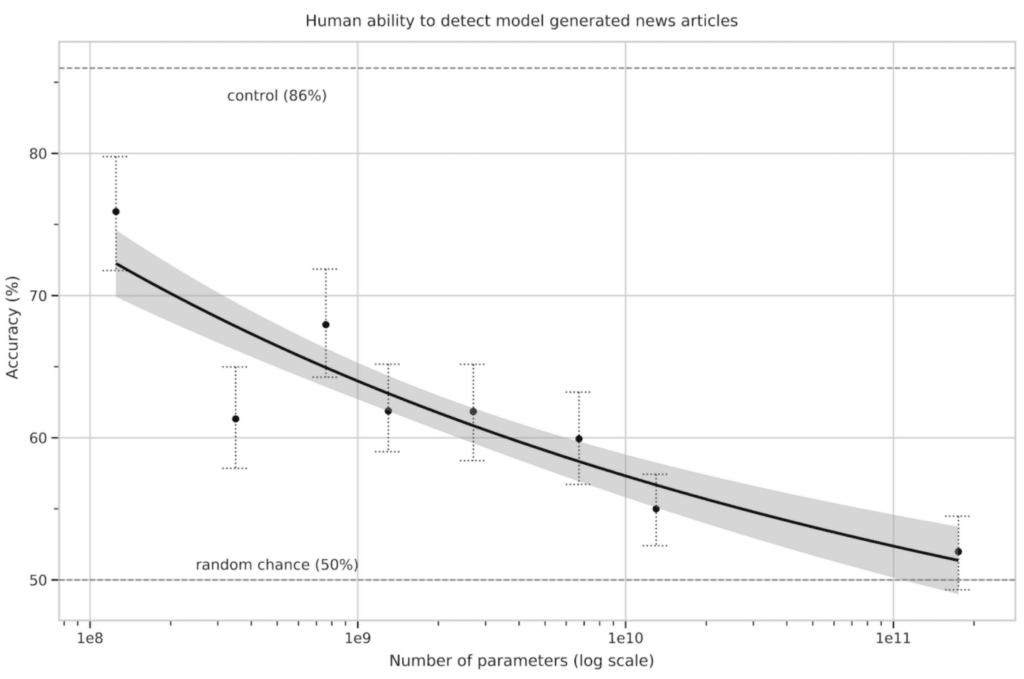
Human vs. GPT-3 Writing
In August 2020, VWO hosted A/B testing of GPT-3 generated text against the human-written text. A total of 18 shortlisted brands out of 450 brands participated and used the GPT-3 API to generate copies in various languages for testing purposes. As per VWO, the participants were highly satisfied with the language accuracy delivered in AI-written content.
In a matter of seconds, GPT-3 content generator can write as convincingly as a human. It can write on any topic, in any style, or in any tone. Here is an example of GPT-3 generated content tweeted by a user.
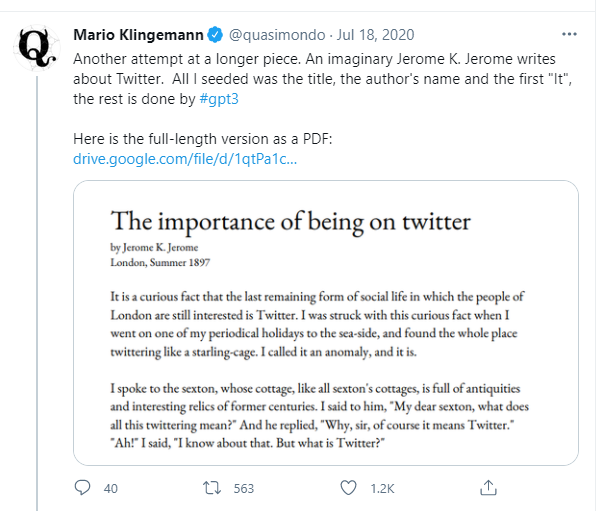
Imagine the amount of time a writer puts into research to gain knowledge of a subject or a topic; competing with him is automated content written by GPT-3 SEO. It has been trained in massive gigabytes of text data and has the collective wisdom of the entire internet in real-time.
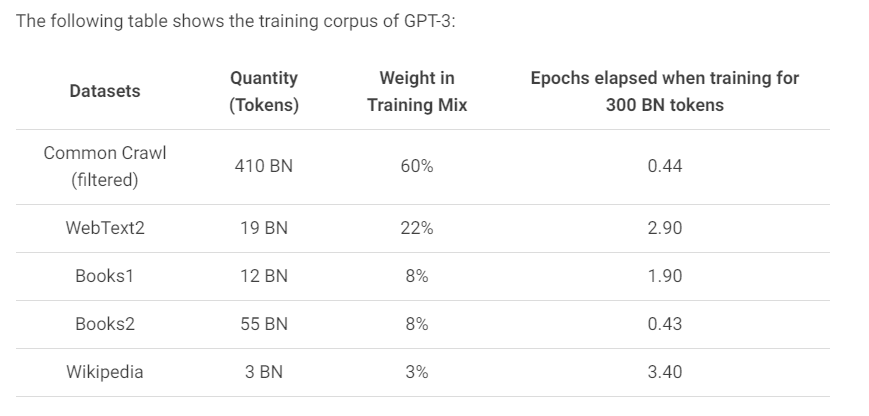
What makes GPT-3 content generator so special vis-a-vis other language models is its capacity of 175 billion parameters.
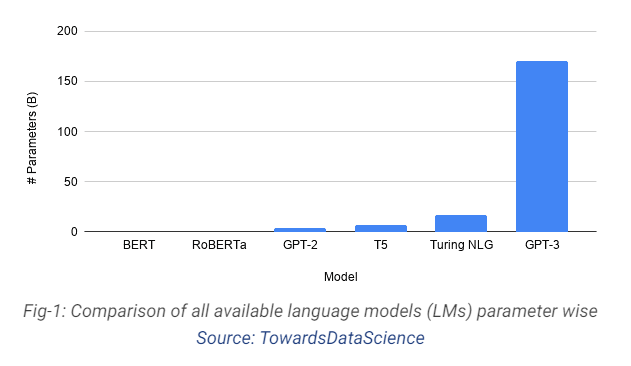
GPT-3 is capable of something called ‘meta-learning’, which makes it a task-agnostic model. As a result, it can perform multiple NLP tasks over different platforms with no or minimal fine-tuning (additional training).
Gmail completes your email sentences, which is also AI, but it is ‘narrow AI’, which means it is trained in a particular task only and won’t work on anything else. Siri, Alexa, and Cortana are all powered by narrow AI.
But being a task-agnostic, GPT-3 content generator can exhibit some properties of general intelligence. Thereby even without hand-engineering on particular tasks, it can achieve human-like efficiency and accuracy in a range of natural language processing tasks such as language translation, text classification, sentiment extraction, news articles generation, writing blogs, creating social media posts, generating tweets, paraphrasing, creating blog topics, question-answer systems, and character dialogues. It can even generate HTML code. GPT-3 writes at 500x the speed of a human writer, its command of grammar and spelling is impeccable. It produces excellent syntax and has a wide vocabulary.
GPT 3: Its Impact on SEO and Content Marketing
GPT-3 content generator can automatically generate text, but what does it all mean for content marketing? Does it mean that from an SEO perspective, content marketing professionals will be able to save money with GPT-3 automated content? Does it mean that the jobs of content writers will become obsolete? And what about search engine algorithms? Will they accept the GPT-3 content, or will it get listed as black hat SEO?
GPT-3 copywriting cannot replace content that focuses on quality and reader engagement because GPT-3 also has limitations, i.e., it can’t think or become creative like a human mind. It learns by digesting colossal language content databases and then writing new synthesized content by leveraging its capacity to predict the next word by assessing the previous words. So, it may create thematically relevant content, but sometimes it can be completely mindless.
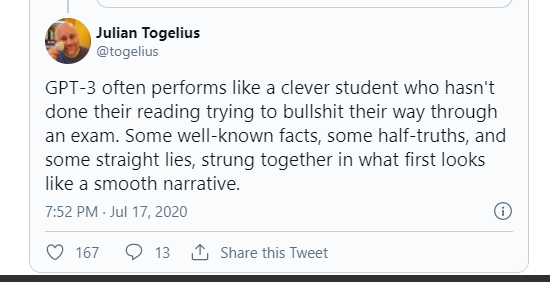
1. GPT-3 can eliminate low-quality or low-cost content mills
GPT-3 content can outperform low-cost and low-quality content sold by content mills that are readable stuffed with keywords but fail to boost social media shares or attract backlinks. When it comes to creating low-tier articles, GPT-3 content will be more reliable because it can better include topic-specific information from reliable sources. GPT-3 content generator will continue to become more affordable in the future, and when that happens, it will force content mills to go out of business.
GPT-3 excels at creating short-term content, and it is a smart tool for purposes like rephrasing, topic optimization, summarization, etc. But with long-form factual content, it loses its way.
2. Will GPT-3 content get ranked?
Using GPT-3 SEO tools, SEO practitioners can access colossal volumes of blogs and articles, that too, by investing much less time and much less money. But can they use these automated content pieces for SEO practices, or will search engines like Google update their algorithm to detect AI-generated content and penalize it?
Because of its capacity to create a massive volume of blog spots, GPT-3 SEO runs into the risk of becoming a tempting tool for black hat SEO strategies, which in turn can lead to spamming of the internet like never before.
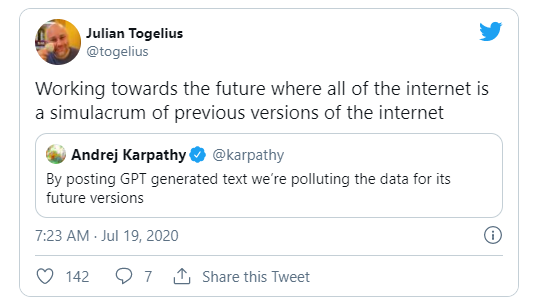
Google’s success as a search engine runs on its ability to connect a user with useful content, and it won’t compromise on that. Google has claimed that for its algorithm, the only criteria for ranking content is how much real value it adds to a user. It doesn’t matter whether it’s AI-written or human-written; if the content is spamming the internet with stale and repetitive information, it won’t get ranked.
3. GPT-3: How can content marketers benefit from it?
Quality-focused content marketers are not here to spam the internet with black hat SEO or low-quality articles. They already avoid such content and focus on quality material that can:
- Connect with readers
- Improve brand awareness
- Increase organic traffic to websites and landing pages
- Boost lead generation and conversion
- Gets shared on social media
- Appeal to a larger audience
Can GPT-3 copywriting help content marketers achieve these objectives? GPT-3 content generator may not always be able to write conceptually original, high-quality, logical, and longer pieces of content, at least not at this point in time. But its AI has a lot to offer that can magnify the potential of a writer by empowering him or her with the enhanced power of ideation. For instance, it can support a writer’s ideation by generating suggestions for headlines, production descriptions, CTA buttons, etc.
Content writing is itself a hard process. It is not just about writing a few grammatically correct sentences. Professional writers need to figure out what to write, how to make it more engaging, how to make it solution-oriented or trendy, and so on. But a considerable amount of time gets spent on tasks like rephrasing, topic optimization, writing SEO meta descriptions, Google ad copies footnotes, author description, product description, etc.
GPT-3 SEO tools can automate these types of writing for a writer’s convenience and give him or her more time to focus on those aspects of writing that require human creativity, diligence, research, and preparation.
For instance, Peppertype.ai is a GPT-3-based content creation tool that has been designed to make ideation a comparatively easier process for a writer. Using the platform, writers or content marketers, within seconds, can get AI-crafted short-form content pieces such as social media post captions, tweets, e-commerce product descriptions, SEO meta descriptions, Facebook ads, blog ideas, newsletter, podcast, and marketing ideas. It can suggest 15 alternative blog ideas or tweet ideas in just one click from a single input. So, pepper.ai as a GPT-3 tool is a big enabler for content developers as it helps them save time, do more meaningful work, and come up with better write-ups.

Key Takeaways
- GPT-3 (Generative Pre-trained Transformer) is a language model that uses deep learning to generate text.
- The GPT-3 Content Generator was created by Elon Musk’s Open AI in June 2020.
- Many tools like Peppertype.ai use the GPT-3 SEO integrated capabilities to generate content.
- GPT-3 content generator can perform multiple NLP tasks over different platforms with no or minimal fine-tuning (additional training).
- GPT-3 content generator can outperform lower quality, keyword-stuffed content generated by low-quality agencies.
- GPT-3 Copywriting is also possible, as it generates text that are are almost similar to those written by humans. It uses training analysis, hence it can be fed information about the users to generate content.
- GPT-3 content generator or any AI-generated content is most suitable to create small captions, CTAs, headlines, and so on. GPT-3 cannot be used to create good quality, long-form content yet.
- GPT-3 content or any AI-generated content cannot compete with human written content, as sometimes it does not make sense.
- GPT-3 will provide a new search engine market for SEO and digital marketers, with powerful NLP.
- Google ranks content based on its relevance. So, a bunch of words stringed together by GPT-3 SEO won’t rank as well as meaningful content.
- GPT-3 content generator will change the face of digital marketing in the future.
- GPT-3 copywriting will not fully replace human writers. It would help them.

Final Words
GPT-3 content generator was launched one year after introducing its predecessor, GPT-2. Within one year only, its makers updated its capacity from 1.5 bn parameters to whopping 175 bn parameters. That’s how GPT language models are rapidly evolving.
In the future, these models will become even more sophisticated and will develop more human-like NLP capacities. With every phase of evolution, it will continue to impact content marketing and the people who practice it. And the only way to stay on top of this advancement is to adapt and grow in alignment with the changes ushered in by GPT and other such technologies. This tool can be a powerful, augmented support for content marketers if they learn how to unlock its potential.
FAQs
Elon Musk’s Open AI released GPT-3 content generator in June 2020. It had been released with a limited beta capacity. Developers signed up on a waitlist to use its capabilities. Many developers across the world have recognized the potential of GPT-3 copywriting and the waitlist has been dopped. Open AI announced on November 2021 that it would be immediately available to developers for use. However, there are some conditions in place. Only certain nations would have access to it. Developers from Cuba, Iran, and Russia will not have access to the capabilities of this fully-integrated GPT-3 SEO.
GPT-3 content generator, like its name suggests, is used to generate realistic automated content, as would be produced by actual humans. It is true that creativity cannot be fed to a machine. But, with user training analysis, the GPT-3 SEO incorporates search engine optimization. Information about the target audience is fed into it to generate almost perfect copies. It has already generated articles, poetry, news reports, stories, dialogue, and so on.
Large machine learning models like the ones needed to train GPT-3 content generator, need huge compute power (hundreds of exaflops) and reduced memory footprint. These models contain large embedding tables. A single GPU is not enough. It would crash if they are tasked with running billion-large parameter language models like BERT or GPT-3. Model parallelism techniques are used to split up the parameters across multiple GPUs. However, they are very costly, difficult to use, and scale. It takes 36 years to train 175 billion parameters GPT-3 content generators with 8 V100 GPUs.
With 175 billion parameters, GPT-3 SEO is the largest content generator language learning model. It is trained with 45TB of text data from different datasets. The model itself has no information. It is not designed to store facts. The only purpose of GPT-3 content generators is to predict the next sequence of words or sentences.
GPT-2 content generators could not generate music and extensive stories. GPT-3 is probably the largest language learning model, to date. GPT-3 SEO is very good at generating storytelling content. It can also summarize text, translate languages, generate computer code, write essays, answer questions, and so on. But, GPT-3 is only good at predicting the next sequence of sentences. It cannot store information.
Latest Blogs
Explore how Google’s 2025 AI search updates triggered ranking chaos. Learn actionable strategies to adapt your SEO for AI Overviews, zero-click searches, and SERP volatility. Stay ahead now.
Learn how to rank on AI search engines like ChatGPT, Perplexity, and Gemini by optimizing your content for authority, structure, and relevance. Stay ahead in AI-driven search with this strategic guide.
Explore the best healthcare SEO services for your medical practice. Improve online visibility and effectively reach more patients in need of your services.
Get your hands on the latest news!
Similar Posts

Peppertype.ai
4 mins read
Taking Writing to the Next Level with Peppertype.ai and GPT-3’s Text-Davinci-003

Peppertype.ai
7 mins read
How Content Generators Work And How To Use Them Effectively
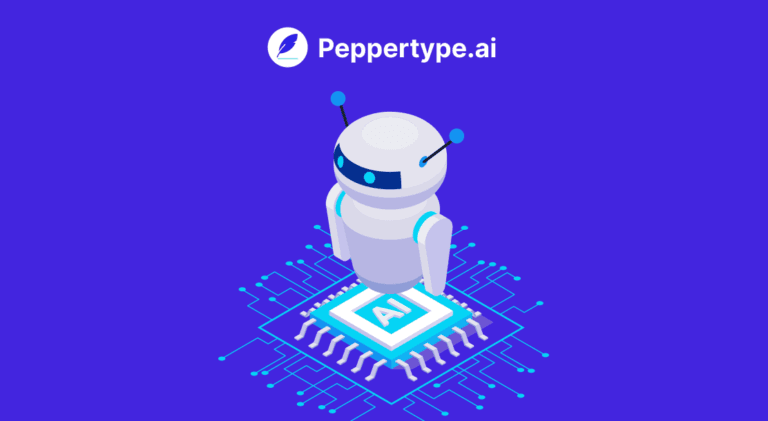
Peppertype.ai
6 mins read